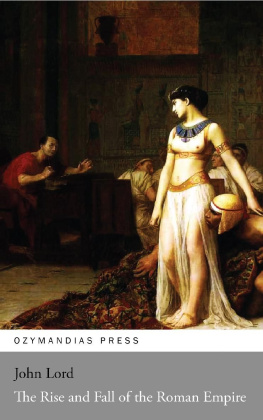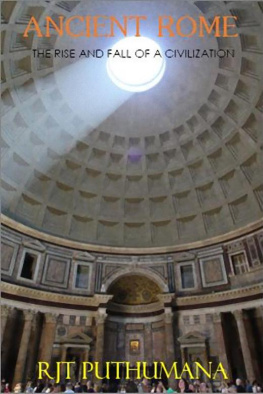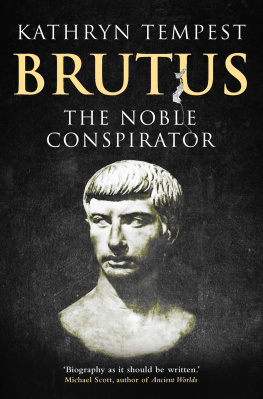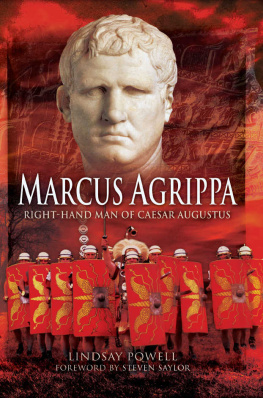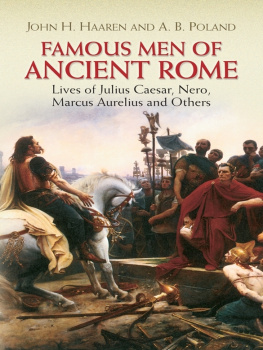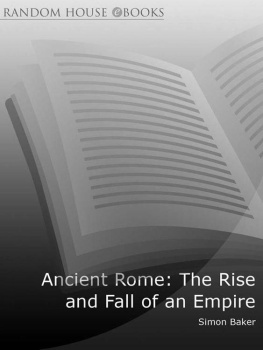TABLE OF CONTENTS
THE CIVIL WARS FOLLOWING THE DEATH OF CSAR.ANTONIUS.AUGUSTUS
~
THE ASSASSINATION OF CSAR WAS not immediately followed with the convulsions which we should naturally expect. The people were weary of war, and sighed for repose, and, moreover, were comparatively indifferent on whom the government fell, since their liberties were hopelessly prostrated. Only one thing was certain, that power would be usurped by some one, and most probably by the great chieftains who represented Csars interests.
The most powerful men in Rome at this time, were Marcus Antonius, the most able of Csars lieutenants, the most constant of his friends, and the nearest of his relatives, although a man utterly unprincipled; Octavius, grandson of Julius, whom Csar adopted as his heir, a young man of nineteen; Lepidus, colleague consul with Csar, the head of the ancient family of the Lepidi, thirteen of whom had been honored with curule magistracies; Sextus Pompeius, son of Pompey; Brutus and Cassius, chief conspirators; Dolabella, a man of consular rank, and one of the profligate nobles of his time; Hirtia and Pansa, consuls; Piso, father-in-law of Csar, of a powerful family, which boasted of several consuls; and Cicerostill influential from his great weight of character. All these men were great nobles, and had filled the highest offices.
The man who, to all appearance, had the fairest chance for supreme command in those troubled times, was Antony, whose mother was Julia, Csars sister. He was grandson to the great orator M. Antonius, who flourished during the civil wars between Marius and Sulla, and was distinguished for every vice, folly, and extravagance which characterized the Roman nobles. But he was a man of consummate ability as a general, was master of the horse, and was consul with Csar, when he was killed, B.C. 44. He was also eloquent, and pronounced the funeral oration of the murdered Imperator, as nearest of kin. He had possession of Csars papers, and was the governor of Cisalpine Gaul. He formed a union with Lepidus, to whom he offered the office of Pontifex Maximus, the second office in the State. As consul, he could unlock the public treasury, which he rifled to the extent of seven hundred million of sestercesthe vast sum left by Csar. One of his brothers was prtor, and another, a tribune. He convened the Senate, and employed, by the treasure he had at command, the people to overawe the Senate, as the Jacobin clubs of the French revolution overawed the Assembly. He urged the Senate to ratify Csars acts and confirm his appointments, and in this was supported by Cicero and a majority of the members. Now that the deed was done, he wished to have the past forgotten. This act of amnesty confirmed his fearful pre-eminence, and the inheritance of the mighty dead seemingly devolved upon him. The conspirators came to terms with him, and were even entertained by him, and received the provinces which he assigned to them. Brutus received Macedonia; Cassius, Syria; Trebonius, Asia; Cimber, Bythinia; and Decimus, Cisalpine Gaul. Dolabella was his colleague in the consulship,a personal enemy, yet committed to his policy.
Csar had left three hundred sesterces to every citizen, (about 3,) and his gardens beyond the Tiber to the use of the people. Such gifts operated in producing an intense gratitude for the memory of a man who had proved so great a benefactor, and his public funeral was of unprecedented splendor. Antony, as his nearest heir, and the first magistrate, pronounced the oration, which was a consummate piece of dramatic art, in which he inflamed the passions of the people, and stimulated them to frenzy, so that they turned upon the assassins with fury. But he assured the Senate of his moderation, abolished the dictatorship forever, and secured his own personal safety by a body-guard.
He had, however, a powerful rival in the young Octavius, who had been declared by Csars will his principal heir, then absent in Apollonia. He resolved to return at once and claim his inheritance, and was warmly received at Brundusium by the veteran troops, and especially by Cicero, who saw in him a rival to Antony. Octavius flattered the old orator, and ingratiated himself in the favor of everybody by his unassuming manners, and his specious language. He entered Rome under favorable omens, paid his court to the senators, and promised to fulfill his uncles requests. He was received by Antony in the gardens of Pompeius, and claimed at once his inheritance. Antony replied that it was not private property but the public treasure, and was, moreover, spent. Octavius was not to be put off, and boldly declared that he would and could pay the legacies, and contrived to borrow the money. Such an act secured unrivaled popularity. He gave magnificent shows, and then claimed that the jeweled crown of Csar should be exhibited on the festival which he instituted to Venus, and to whose honor Csar had vowed to build a temple, on the morning of his victory at Pharsalia. The tribunes, instigated by Antonius, refused to sanction this mark of honor, but fortune favored Octavius, and, in the enthusiasm of the festival, which lasted eleven days, the month Quintilius was changed to Juliusthe first demigod whom the Senate had translated to Olympus.
Meanwhile Brutus and Cassius retired from public affairs, lingering in the neighborhood of Rome, and the provinces promised to them were lost. At Antium they had an interview with Cicero, who advised them to keep quiet, and not venture to the capital, where the people were inflamed against them. Their only encouragement was the successes of Sextus Pompeius in Spain, who had six legions at his command. Cicero foresaw that another civil war was at hand, and had the gloomiest forebodings, for one or the other of the two great chieftains of the partisans of Csar was sure of ultimately obtaining the supreme power. The humiliating conviction that the murder of Csar was a mistake, was now deeply impressed upon his mind, since it would necessarily inaugurate another bloody war. Self banished from Rome, this great and true patriot wandered from place to place to divert his mind. But neither the fascinations of literature, nor the attractions of Tusculum, Puteoli, Pompeii, and Neapolis, where he had luxurious villas, could soothe his anxious and troubled soul. Religious, old, and experienced, he could only ponder on the coming and final prostration of that cause of constitutional liberty to which he was devoted.
Antonius, also aware of the struggle which was impending, sought to obtain the government of Cisalpine Gaul, and of the six legions destined for the Parthian war. But he was baffled by the Senate, and by the intrigues of Octavius, who sheltered himself behind the august name of the man by whom he had been adopted. He therefore made a hollow reconciliation with Octavius, and by his means, obtained the Gaulish provinces. Cicero, now only desirous to die honorably, returned to Rome to accept whatever fate was in store for him, and defend to the last his broken cause. It was then, in the Senate, that he launched forth those indignant philippies against Antonius, as a public enemy, which are among his greatest efforts, and which most triumphantly attest his moral courage.
The hollow reconciliation between Antonius and Octavius was not of long duration, and the former, as consul, repaired to Brundusium to assume command of the legions stationed there, and Octavius collected his forces in Campania. Both parties complained of each other, and both invoked the name of Csar. Cicero detested the one, and was blinded as to the other.
The term of office as consul, which Antonius held, had now expired, and Hirtius, one of the new consuls, marched into Cisalpine Gaul, and Octavius placed himself under his command. The Senate declared a state of public danger. The philippics of Cicero had taken effect, and the Senate and the government were now opposed to Antonius, as the creator of a new revolution. The consuls crossed swords with Antonius at Forum Gallorum, and the consul Pansa fell, but success was with the government. Another success at Mutina favored the government party, which Octavius had joined. On the news of this victory, Cicero delivered his fourteenth and last philippic against Antonius, who now withdrew from Cisalpine Gaul, and formed a junction with Lepidus beyond the Alps. Octavius declined to pursue him, and Plancus hesitated to attack him, although joined by Decimus, one of the murderers of Csar, with ten legions. Octavius now held aloof from the government army, from which it was obvious that he had ambitious views of his own to further, and was denounced by Plancus to Cicero. The veteran statesman, at last, perceived that Octavius, having deserted Decimus (who, of all the generals, was the only one on whose fidelity the State could securely lean), was not to be further relied upon, and cast his eyes to Macedonia and Syria, to which provinces Brutus and Cassius had retired. The Senate, too, now distrusted Octavius, and treated him with contumely; but supported by veteran soldiers, he demanded the consulship, and even secretly corresponded with Antonius, and assured him of his readiness to combine with him and Lepidus, and invited them to follow him to Rome. He marched at the head of eight legions, pretending all the while to be coerced by them. The Senate, overawed, allowed him, at twenty years of age, to assume the consulship, with Pedius, grand-nephew of Csar, for his colleague. Since Hirtius and Pansa had both fallen, Octavius, then leaving the city in the hands of a zealous colleague, opened negotiations with Antonius and Lepidus, perceiving that it was only in conjunction with them that his usurpation could be maintained. They met for negotiations at Bononia, and agreed to share the empire between them. They declared themselves triumvirs for the settlement of the commonwealth, and after a conference of three days, divided between themselves the provinces and legions. They then concerted a general proscription of their enemies. The number whom they thus doomed to destruction was three hundred senators and two thousand knights, from the noblest families of Rome, among whom were brothers, uncles, and favorite officers. The possession of riches was fatal to some, and of beautiful villas to others. Cicero was among this number, as was to be expected, for he had exhausted the Latin language in vituperations of Antonius, whom he hated beyond all other mortals, and which hatred was itself a passion. He spoke of Csar with awe, of Pompey with mortification, of Crassus with dislike, and of Antony with bitter detestation and unsparing malice. It was impossible that he could escape, even had he fled to the ends of the earth. The vacillation of his last hours, his deep distress, and mournful agonies are painted by Plutarch. He fell a martyr to the cause of truth, and public virtue, and exalted patriotism, although his life was sullied by weakness and infirmities, such as vanity, ambition, and jealousy. In the dark and wicked period which he adorned by his transcendent talents and matchless services, he lived and died in faiththe most amiable and the most noble of all his contemporaries.

